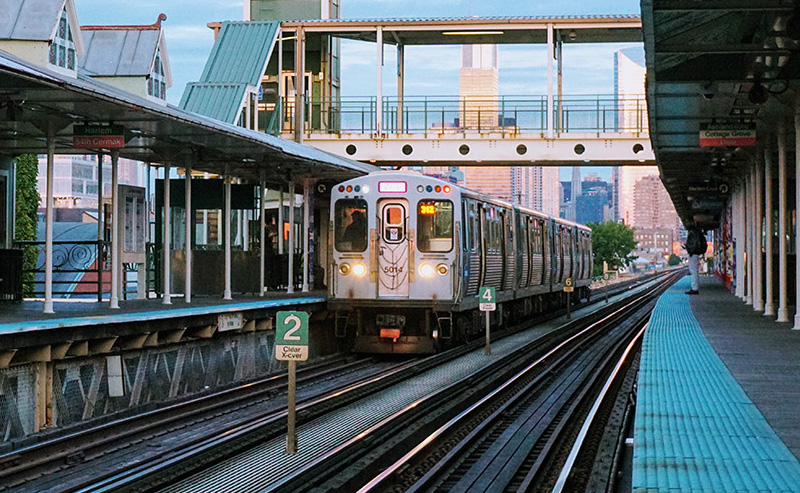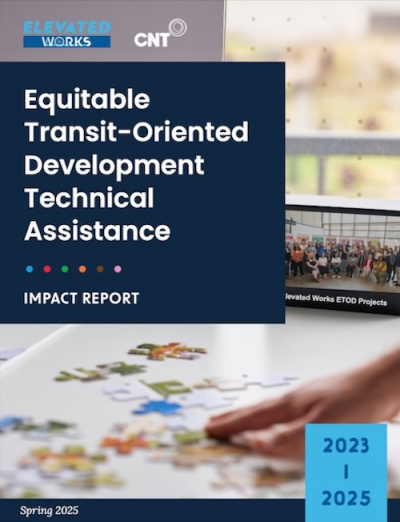
Advocacy Perspective on the History of Equity in Transportation
At this year's Transportation Research Board's (TRB) meeting, twelve TRB committees came together to sponsor a session entitled, "Equity Reframed: Looking Back and Planning Ahead." The focus was to review historical milestones and forecast future opportunities to eliminate systemic barriers to full equity by marginalized communities and to provide more equitable access to transportation services. As a speaker, I had the opportunity to share CNT’s perspective. Our session ... Read the rest of this entry »
TNC's Residential Parking Impacts and Housing Affordability
Transportation experts often talk about the potential of Transportation Network Companies (TNCs) to solve the “last mile problem.” What they usually mean is the potential for people to use TNCs in combination with transit to reach key destinations just outside the reach of transit. Many of the collaboration pilots around the country between TNCs, transit agencies, and employers are aimed at addressing the last mile problem of work trips, particularly to suburban locations that lack safe... Read the rest of this entry »
Is Ridehailing Equitably Available Across Chicago?
In collaboration with the Institute for Sustainable Communities, CNT analyzed equity of access to smart mobility in Chicago and nine other cities across the country. The purpose of the report was to explore disparities in access to transportation options that incorporate technology, support a clean environment, and enhance access to opportunity. CNT calculated measures related to accessibility, employability, livability, and mobility, broken out by race, ethnicity, and income. Check out the... Read the rest of this entry »
Who Will Really Pay The Most for New Ride Hailing Fees?
In the weeks since Mayor Lightfoot proposed changes to the tax structure for ride hailing trips, much of the discussion around the changes has centered whether they are equitable. The transportation network companies (TNCs), as well as community leaders and residents have raised concerns that increasing fees will make using ride hailing unaffordable in Black and Brown neighborhoods on South and West Sides, where incomes are lower, car ownership less common, and these services have the potential... Read the rest of this entry »
TNC use, Transit, and Vehicle Ownership in Chicago
Transportation Network Companies (TNCs) are increasingly significant contributors to the transportation system in Chicago. A recent study commissioned by Uber and Lyft estimated that Uber and Lyft rides represent 3.3% of VMT in Cook County. That figure is likely significantly higher in the city of Chicago, and particularly in some of the city’s most dense and congested neighborhoods. The city’s TNC dataset shows that different parts of the city are using TNCs differently, and these differences... Read the rest of this entry »
Chicago Proposes New TNC Fees that would Improve Equity and Sustainability
The City of Chicago recently released a new proposal to restructure the fees the city charges for rides people hail with transportation network companies like Uber, Lyft and Via. Currently, the City of Chicago charges a flat, per-trip fee for all TNC rides, regardless of whether the trip is a shared or solo ride, and regardless of where and when the trip occurs. The new proposal increases fees on solo rides, particularly those that begin and end downtown during times of peak congestion. Shared... Read the rest of this entry »
Celebrating Summer, Sustainability, and 40 Years
Building on past years’ success, the Young Innovators fifth annual summer fundraiser welcomed a diverse group of participants and experts. We had 40 guests attend a splendid afternoon with the weather on our side as we enjoyed locally- and ethically-sourced treats and insightful conversations. We kicked off the event with an overview of actions planned by CNT stakeholders for improving current climate and transportation challenges. Special guests included staff from organizations such... Read the rest of this entry »
Do New Mobility Options Mean More Affordable Cities?
New technologies are changing how people get around. In cities around the world, cars, bikes, scooters, and even pogo sticks can be only a few taps on a smartphone screen away. Of all these modes, Transportation Network Companies (TNCs) like Uber, Lyft, and Via are the most prominent. Here in Chicago, the number of active TNC drivers has grown from 15,000 in March 2015 to nearly 68,000 in 2019. In March 2019, over 10 million TNC trips took place in Chicago, with pickups and drop-offs in... Read the rest of this entry »
What eTOD Plans Need to Consider
Since its inception, CNT has pioneered sustainable, equitable, and growth-oriented solutions that reimagine how cities think about transportation and land use. One area of work is equitable transit-oriented development (eTOD), which helps underserved communities tackle affordability, meet transportation needs, and decrease climate change impacts. In light of increased community interest in walkable, connected environments, CNT recently hosted a series of workshops addressing pertinent eTOD... Read the rest of this entry »
Beyond the Bill – Reflections on Achieving Community Affordability
Toward the end of March, CNT presented at Flint’s 3rd annual Environmental Justice and Resiliency summit. The summit featured four days’ worth of panels, interactive sessions, and trainings on topics ranging from trauma-informed art therapy to creating a blue-green economy in Flint. CNT was pleased to share the stage with Amy Hovey of the C.S. Mott Foundation, Leah Wiste of Michigan Interfaith Power and Light, and the City of Flint’s former CFO Hughey Newsome and Water Superintendent Rob... Read the rest of this entry »





 Strengthening Transit Through Community Partnerships
Strengthening Transit Through Community Partnerships








